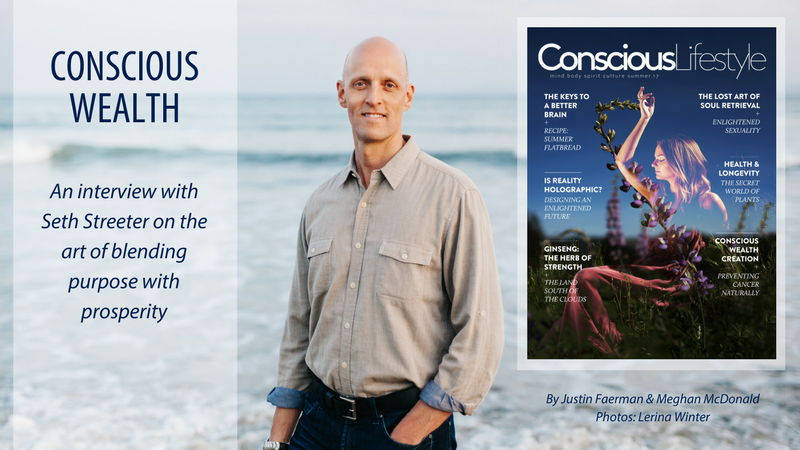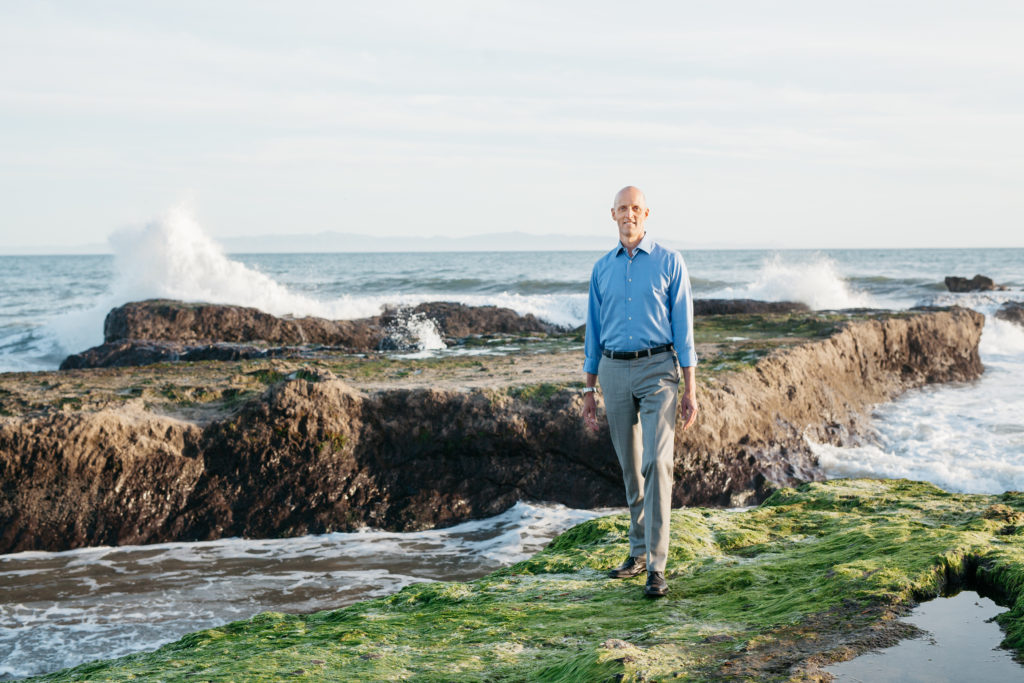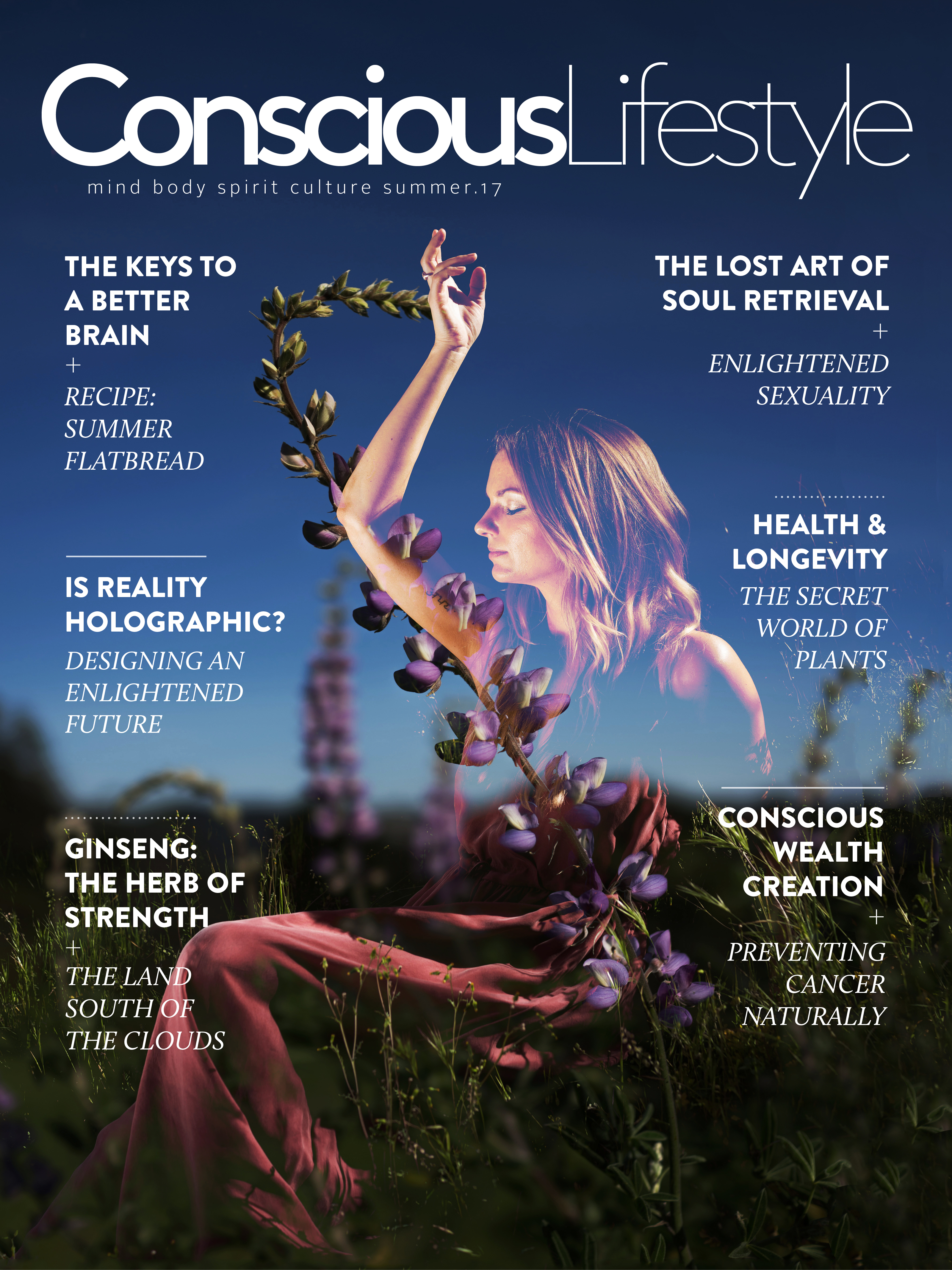
Conscious Lifestyle Magazine's Justin Faerman and Meghan McDonald recently sat down with Mission Wealth CEO and founder Seth Streeter for an in-depth interview exploring the art of blending purpose with prosperity. We have shared a few excerpts from the interview below. If you would like to read the entire article, the dialogue is published in the summer 2017 issue and is available to view online at Conscious Lifestyle Magazine.
“Conscious wealth looks at the broader picture of
what wealth truly should be.” - Seth Streeter
Conscious Lifestyle Magazine: Please define "conscious wealth" and give us an outline of what it means and what’s involved in it, so that anybody walking into this conversation can wrap their head around what we’re talking about.
Seth Streeter: Wealth traditionally has been about money — it’s been about material accumulation, it’s been about your 401(k) plan, it’s been about the home you purchase — it’s how much money is in the bank account. Conscious wealth is when we step beyond that definition and look at our lives much more holistically and factor in different components, such as our health, our relationships, our career satisfaction, the amount of impact we’re having in the community and in the world, to our intellectual growth, to our spiritual capital, to our emotional well-being. These broader definitions are what I’m really calling "conscious wealth."
Because someone could be worth $50 million, but if they can’t climb two flights of steps without being winded because they’re so out of shape, and they go home a stranger to their family because they’re working all the time, and they need sleeping pills to sleep at night because they have so much anxiety, are they truly wealthy just because they’re worth $50 million? So, conscious wealth looks at the broader picture of what wealth truly should be.
CLM: Beautiful. So, let’s dive into some more of these different aspects. Can you define the Ten Dimensions of Wealth and Holistic Success?
SS: The one that everyone knows about is the financial dimension. Do you have enough to live your life? Wealth is living within your means. So, as long as you have enough to live the life you want to live, well, then you’re wealthy. The next component of wealth is impact. Do you feel like you’re really leveraging your talents and gifts in the world and making a difference? It could be in a small way, volunteering with one child at a school, or pet-sitting. Or, it could be in a really large way in which you want to impact the environmental issues we’re facing today or global illiteracy. So, impact is an important dimension of wealth because we know the more we give, the more we get. Emotional wealth has to do with your attitudes and well-being. Do you wake up happy? Are your stress levels low?
The social and family dimensions have to do with our intimate relationships—both our family and friends, as well as our relationships in the community. The amount of fun we have is about whether you are living your bliss? Do you have big belly laughs? Are you having enough fun in your life? A lot of people are really actually lacking in that wealth factor. Your physical wealth has to do with how your body looks, feels, and functions. Is it able to do what you want it to do without pain or injury? Spiritual wealth is your connection to a framework beyond the everyday, something that anchors and centers you. Intellectual wealth is whether you’re feeling stimulated. Do you feel like you’re growing intellectually or do you feel kind of stagnant? Your career wealth has to do with whether you feel you’re being appreciated for your talents and contributions and do you feel aligned with a mission beyond yourself with your employer.
CLM: Of the Ten Dimensions, which are the ones that you see people struggling with the most?
SS: I would say it all starts with the self. Most people are so focused outside of themselves — and I’ll say financial, of the ten, is the one that hits on that the most. Because most people are thinking that once they get that job promotion, once they make more money, once their 401(k) balance goes up, once they can buy their first home, once they pay off their school debt — well, then finally they can be happy! So, it starts from a finance standpoint because people might actually attain those milestones — they might get the job, get the new car, get the promotion — and then realize they’re never satisfied because that benchmark always gets raised to another level. This goes for people I know who are worth $20 million who are not satisfied because their neighbor has $30 million, and then that person knows someone who has $50 million. And you’re never there when you’re looking for these external benchmarks to then trigger internal happiness; it doesn’t work that way.
So, I would say once someone realizes that that’s fools’ gold, that pursuit of the external, it really gets into the personal. Really, it’s a blend. The spiritual is a big part of it; the physical too — if you don’t feel good it’s hard to perform in life. Your social structure matters, specifically because the people you are around all the time shapes the person you are, so if you’re around people who are solely focused on “greed is good” and capitalism in the traditional sense, then you are going to think that is what you need to be pursuing. So, oftentimes, re-shifting a social structure really helps someone find more of that personal balance. Emotional well-being is critical; there are so many people who are so stressed and beating themselves up to try to get ahead — fighting traffic, battling hundreds of emails, doing the dance everyday—thinking that once they finish those emails at midnight and once they get ten appointments in a week, then, finally, I’ll be good enough.
All of these other nine dimensions, besides finance, blend together because it comes down to realizing that your sense of worthiness isn’t tied to any type of performance. There’s nothing you can achieve or acquire that will allow someone to actually feel worthy. Once someone gets that eye-opener, that translates across the board—in their careers, relationships, health and their emotional well-being, and in the impact they’ll ultimately be able to have in the world.
 CLM: How do you see peoples’ lives shift once they make that connection to the deeper aspects of conscious wealth? That is, once they understand that they are being psychologically driven by these unconscious things, that aren’t necessarily in alignment with their life purpose, and let them go, what happens?
CLM: How do you see peoples’ lives shift once they make that connection to the deeper aspects of conscious wealth? That is, once they understand that they are being psychologically driven by these unconscious things, that aren’t necessarily in alignment with their life purpose, and let them go, what happens?
SS: Oh, man! It’s really exciting! It’s incremental and sometimes it’s exponential. When someone has the AHA! – which really comes from hitting a pause button in their life and actually asking: “Am I happy or do I need to redirect my energies and focus elsewhere?” Once they make that shift, then all of a sudden, I’ve seen that things really start to fall in line. People might make major career changes and then their stress levels go down. As their stress levels go down, their health improves. As their health improves and their stress goes down, they have more family time and balance, their relationships improve. As they have more time and balance, they begin to think about ways in which they can give back, which they didn’t have time for before. There is an absolute domino effect between all these other nine dimensions that all seem to conspire in someone’s favor toward justifying and validating the decision to step away from that prior path and into what’s truly in alignment with their highest goals.
“I realized firsthand how financial wealth really wasn’t the sole source of happiness for most people.”
CLM: Can you talk to how having a healthy relationship with money can actually be in support of your spiritual path and the spiritual dimension of love? How can we include money on the spiritual path, because it’s so necessary in our day-to-day lives?
SS: The spiritual framework around money is really about creating value by being of service to others. And, when you are leveraging your gifts and being of service to others in your own unique way, then money will be a by-product of that, rather than saying: “I need to make as much money as possible and what careers will pay me the most money?” I’ve counseled a lot of young people over the years and eventually with this type of thinking they will burn out because they’re not being fueled from an authentic place. So, really, the spiritual connection to money is about authenticity, it’s about service to others, it’s about recognizing that your job is to be in full expression of your gifts into the world; and, if you do that, money will be a by-product.
CLM: So how does this tie in to life purpose? A lot of people make their money just being driven by wealth. But, after a certain point, after you make enough money, then what?
SS: It’s interesting; I’ve worked with a lot of executives over the years, and I’ve taken them through a process I call the Inspired Life Purpose™ assessment. The best part is that when we have them look at the intersection of the four categories from the exercise—where their gifts intersect with their skills and education, what their greatest passion is and what they believe the world needs most—that intersection is their inspired life purpose. What’s really cool is that, instead of just thinking about return on money, it’s important for people to reflect on their return on purpose. What type of return are you getting on the purpose that’s within you that you really can’t deny? The one that has always been knocking on the door inside your soul. Return on purpose is an important dimension of wealth when we look at our Conscious Wealth assessment.
CLM: Return on purpose instead of return on investment. So, the more you align with your purpose, the more return you get?
SS: Absolutely. That’s been a truth I’ve seen over and over again. Back to those examples where people are taking the job out of college that they think will pay them the most rather than saying or thinking, “My biggest priority is to be in pursuit of my inner purpose. And I’m going to be in the fullest expression of my gifts, abilities, skills, and passion to try to push this purpose forward.” If those are the two things that they focus on, I can tell you they will achieve tremendous success and tremendous wealth in the ways that matter most to them.
"What are your unique assets that can be leveraged to help build more value and more financial wealth in your life?"
CLM: So many people just ignore finances, especially conscious people because money has got so much stigma around it. Without guidance, without having gone to school for it, it could be a little intimidating. It’s pretty straightforward; if things get complicated, then you can just go with a financial advisor.
SS: There are also a lot of online "robo" advisors available today. You could do this all from the comforts of your home and be able to have professionally managed money much cheaper than ever before. There’s really no excuse; it can be done — with a few clicks of a button, you can have a portfolio. The thing that I would encourage people to think about is not just their financial assets but that we all have a lot of forms of assets. What is your artistic capital? Maybe you have a lot of creative genius that isn’t being fully deployed with your current employer. Or, maybe you have good social capital: you have some really fantastic relationships and connections that you aren’t fully leveraging right now. Intellectual capital: what’s something that you have knowledge of or unique insight into that maybe isn’t being brought into the marketplace today? So, when you’re thinking about your assets, it’s not just “how much cash and debt do I have today?” It’s “what are your unique assets that can be leveraged to help build more value and more financial wealth in your life?”
Read more in the full interview here >>
In the full interview, Seth explains how the Ten Dimensions of Wealth came together for him and how it relates to his experience and background. He then clarifies that there is a certain baseline of financial practicality that needs to be adhered to. Some other takeaways:
- Having a healthy relationship with money can actually be in support of your spiritual path and the spiritual dimension of love.
- We can include money on the spiritual path, because it’s so necessary in our day-to-day lives.
- Even though a lot of people make their money just being driven by wealth, after a certain point, they want to find out what comes next.
- The Inspired Life Purpose Assessment helps people think not just think about their return on money, but to reflect on their return on purpose.
- He later talks about trends in the financial evolution, including careers where people want to work for mission-led companies and be part of a culture that feels really aligned with them.
- Financial evolution trends with socially responsible investing and reframing success.
- A 4-step process to getting started at conscious wealth creation.
- The important relationship between success and playfulness.
View the article straight from the Spring 2017 issue here:
Seth Streeter is CEO and founder of Mission Wealth, a leading wealth management company that serves hundreds of clients across the United States. As a speaker and thought-leader on the subject of conscious wealth, Seth helps others re-frame their perspective of wealth beyond finances so that they can enjoy more balanced, fulfilled and impactful lives. You can view his TedxTalk on the Ten Dimensions here. In 2015 Seth was recognized by Real Leaders magazine as one of the Top 100 visionary leaders who strive to create a better world, due to his work in conscious finance.
Inspired Living™
Are you living your life in a way that brings you joy and meaning?
Join the Inspired Living™ movement to elevate your past, present and future. Let us introduce you to prominent thought-leaders, life coaches, and influencers who can work together with you to develop your customized life plan. We will give you curated resources, actionable advice and targeted strategies during your journey of self-discovery. Then we will align your multi-dimensional and multi-faceted life with your ultimate vision so that you can become the BestU™ in your life journey. Learn More
953687 6/17

